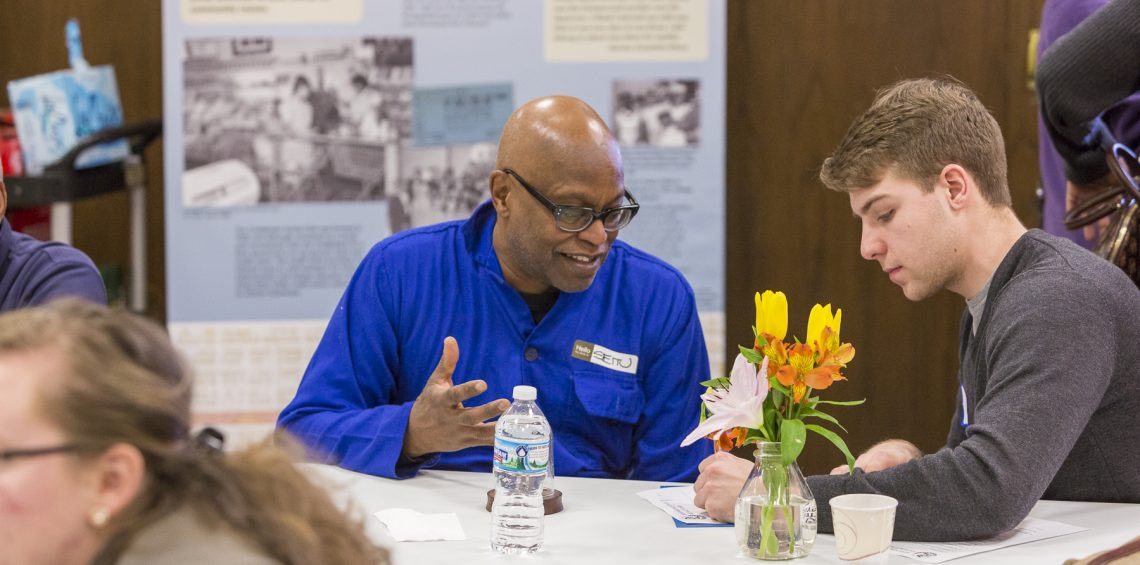Remembering Rondo: A History Harvest (Spring 2016 and Spring 2017)
Using the History Harvest Model, Professors Rebecca WingoAmy Sullivan, and Crystal Moten have partnered with Rondo Avenue, Inc., the representative council of the Rondo neighborhood. After the passage of the Federal-Aid Highway Act in 1956, the Department of Transportation intentionally constructed I-94 linking the Twin Cities through Rondo, effectively bifurcating the majority African American community there and cutting through their economic district. The History Harvest is a student-driving digital archive that seeks community contributions, empowering the community to stake a claim over their own digital identity, memories, and history.
- Visit the archive
- Rebecca S. Wingo and Amy Sullivan, “Remembering Rondo: An Inside View of a History Harvest,”Perspectives on History, March 2017
- Alexandra McLaughlin (’16), “History Harvest,”Macalester News, March 2016
- Tom Crann, “Macalester, community group team up on Rondo history project,”All Things Considered, Minnesota Public Radio, March 4, 2016
Rondo Business Map (Spring 2017)
Continuing the partnership with Rondo Avenue, Inc., students in Professor Wingo’s “Public History in Action: Archives” course digitized old newspaper ads from Twin Cities black newspapers to reconstitute the historic business district from 1920-1960. The map shows the vibrancy of the Rondo community and the large number of businesses supported by the community’s residents over 40 years.
Study of History (Spring 2018)
Professor Linda Sturtz’s “Study of History” course is a required course for history majors. In this class, students gain broad exposure to research methods and career paths in history. Students in the Spring 2018 course wrote blogs about their experiences at the Minnesota Historical Society, Wangensteen Library, and the East Side Freedom Library to briefly introduce them to public and digital history.
Study of History (Spring 2017)
Professor Linda Sturtz’s “Study of History” course is a required course for history majors. In this class, students gain broad exposure to research methods and career paths in history. Students in the Spring 2017 course wrote blogs about their experiences at the Minnesota Historical Society to briefly introduce them to public and digital history.
Transatlantic Slave Trade Project (Fall 2015, Fall 2016)
Students in Professor Linda Sturtz’s “Transatlantic Slave Trade” course made a series of StoryMaps to ground slave narratives geographically. Using the Trans-Atlantic Slave Trade Database, students located the records for the ships carrying the individual in their assignment slave narratives, and used the prose from the narratives to add dimension to a difficult history.
- Emma Wise (’18), “Slave Trade History,”Macalester News, February 2016
Text Analysis of Castro’s Speeches (Spring 2016)
In Professor Ernie Capello’s “Cold War Latin America” course, students completed group projects analyzing the rhetoric of Fidel Castro’s speeches. Using Voyant Tools, students examined speech patterns, commonly used words, and frequency of words over the course of the speech. They compared their results to other iconic speeches in their assigned time periods to provide deeper context and meaning to individual speech analyses. After the presentations, one student said, “This is what we go to college for.”
.@Macalester students use @VoyantTools to examine Castro’s #ColdWar speeches. #twitterstorians pic.twitter.com/fwx4IJt1VF
— Rebecca S. Wingo (@rebeccawingo) March 7, 2016
